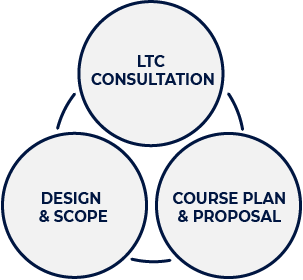Phase 1: Short course plan, proposal, and scoping
Phase 1 comprises three activities designed to develop a high-level design and project plan to support the development and delivery of your short course. Short course teams may start the process with any one of these activities. No matter the entry point, we recommend undertaking each of these activities to ensure a short course that is of quality, achieves the desired outcomes, and takes advantage of the affordances of the platform.

LTC Consultation - LTC can provide guidance on the development of the short course pre-proposal, including input into the learning and teaching approaches best suited to the short course format, and considerations to assist in learning design and development of the short course.
Course Plan & Proposal - This activity involves completing the process to obtain formal approval to offer the short course, including the development of suitable learning outcomes and assessments and other elements requested on the Lifelong Learning Short Course Proposal Form.
Design & Scope - Particularly for short courses requiring LTC expertise, this activity works through the alignment of outcomes, sequencing and scaffolding of content and activities, the design of assessments appropriate to the short course space, and the development of project plans and timelines to ensure timely delivery of the short course.
Expand the sections below for more detailed information about each of the Phase 1 activities.
A consultation with LTC is recommended when you are first considering the prospect of creating a short course (prior to completing a short course proposal). This consultation involves a discussion with an LTC specialist about the design of a short course. LTC is able to provide support for short course planning and learning design, including the development and mapping of aligned learning outcomes and assessment and guidance in completing the design components of the short course proposal documentation.
LTC consultations are also available for the review of existing short courses. This consultation can assist with identifying design strengths and/or potential areas for digital uplift in alignment with online learning environment standards and short course design principles.
To offer a short course, you will be required to develop a description and overview of the course including the identification of suitable learning outcomes and assessments. You will also be asked to supply information regarding viability, target market, learner information, and resourcing. The details of this process are outlined in the Short Course & Non-Award Course Management Procedure.
In preparing your proposal, consider the following resources, as this information will play a critical role in the development and construction of your course at later stages of the process.
- Purpose: Clearly articulate your purpose and goals for the course. By clearly defining your aims, you can then determine measures of success and how you will evaluate the course.
- Consider and Understand Learner Needs: Consider who your learners are, their expectations for the learning experience, their assumed prior knowledge, and the knowledge, skills and attitudes they may need to demonstrate by the end of the course. This information will assist you in designing the experience and in defining outcomes and assessments. Understanding learner needs provides some recommendations and templates to assist you in considering your learners in the design process.
- Learning Experience and Learning Journey: It's important to consider the learning pathway. Will this be a single short course or a suite of short courses? If it’s the latter, you may want to consider at this stage if there are common elements (graphics, look and feel, terminology, style conventions) that will be used across the suite and how learning resources and activities might be distributed across individual short courses.
- Outcomes: The learning outcomes describe what the learner will be able to do at the end of the short course and need to be constructively aligned with the assessment. In the short course space, learning outcomes take on significant importance not only as a critical element of good learning design, but also as a central element of the assessment functionality of the short course platform. Even if you are familiar with writing learning outcomes, it is recommended that you revisit Writing learning outcomes prior to submitting your short course proposal.
- Assessment: The assessment in your short course should be constructively aligned with your learning outcomes. The short course platform relies on this constructive alignment to make full use of the assessment tools available; therefore, outcomes need to be clearly mapped to assessment tasks. Read Introduction to assessment for assistance in thinking about your assessment tasks. Additionally, Authentic assessment is best suited to the short course format.
- Evaluation: Short courses comprise a variety of learning experiences with different aims and purposes; therefore, it is critical to identify criteria for success and to determine how you will evaluate success. Evaluating learning events provides some guidance and considerations on this topic.
The purpose of design and scoping activities is to flesh out the details of the short course and establish the critical milestones and timelines for launch. These activities include establishing an outline/sequence of modules, content, and learning activities in alignment with course outcomes. Setting milestones and timelines will ensure the timely delivery of the short course. In planning for these, consideration of contingencies (and appropriate windows of time) in the development process is important. This will provide you with flexibility should unforeseen circumstances arise, or you need to shift deadlines.
At this point in the design and development of your short course, you are not expected to be knowledgeable about a particular short course platform; rather, this is your opportunity to plan your overarching structured sequence of content and learning activities using your subject matter expertise.
The following resources can assist you with your design and scoping activities:
- Module Planner Template - Complete one of these for each module within your short course.
- Development project plan - This will assist you in planning the timeline for delivery of your short course.



